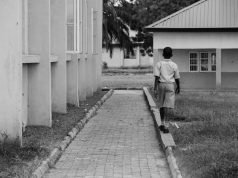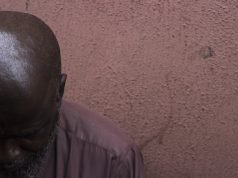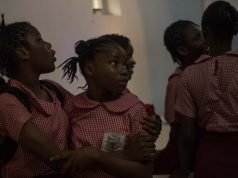A PIGEON squeezes through a chink in the bedroom window and flies round and round, upsetting things—the ceramic candle stand, the incense sticks, the mug of pimply gruel. Its shadow trickles over the newsprint pasted on the walls until the wizened paper is pockmarked with fluttering, bird-shaped motifs.
Christopher watches the images before him. He is wary of them, unable to determine whether the bird is only a phantom, a thing brimming over, spilling, splattering on his mind. He has now almost completely lost the ability to preside over his own cognition, to pick from it the things that do not belong, to toss them over his shoulders.
Outside the window, the branches of the willow shake, casting distended beads of water on the glass pane. A two-seater airplane chugs over the wrought iron fence, its tail caught in the white flounces of cotton clouds.
Christopher lifts himself up from the bed. Static crackles in his head, and his wispy body begins to slump. He holds tight onto the bedpost so that his knees do not buckle. The dizzy spell lasts a few moments.
The pigeon is now perched in a corner of the room, next to Christopher’s leather work boots. The bird watches him. Its eye, the right one, is covered with what appears to be chewing gum. Christopher walks towards it, slowly so as not to startle it, so as not to exert himself. The bird does not balk, not even when Christopher bends down to pick it. It teeters on the edge of his hand, its tiny talons clawing into his wrist, its wings spread out, beating at his face, clambering for balance.
Christopher’s fingers curl beneath the bird, cupping it, strangely familiar with its soft underside. His palms prickle with memory. He sees himself, a puny ten-year-old. He and his sister Julie are at the Holy Family Basilica. The school bus dropped them off there an hour earlier, and they are waiting for their mother. He and Julie wander to the grotto where devout women kneel and lament to the Blessed Mother, their rosary beads tucked in the hems of their poplin skirts.
He sees the pigeon hunched at the cold feet of Mary, its left wing hanging uselessly behind it, like a carelessly-worn poncho. Despite Julie’s frenzied protestations, and despite the filthy looks he gathers from the stout, muttering women, Christopher jumps over the iron partition and into the grotto, tearing his school khakis in the process. He picks the bird up and cradles it to his chest. Later, at home, he makes a little cast for its broken wing using his mother’s knitting needles and his father’s roll of red insulating tape. He nurses it, coaxes it to stay, but the bird only shrinks deeper within itself until there is not a flicker of life left in its eyes.
Christopher blinks, bewildered. Before his girlfriend Ana left him, she had accused him of smothering her. He sees now that he had been this way even as a child: desperately clutching at things, not loving them but harbouring a sordid desire to appropriate.
Christopher walks across the room, turns the doorknob and puts the bird down in the terrace, on the mahogany handrail. The bird hops about, but only to adjust its position so that Christopher comes within its line of vision. It watches him with glimmering, russet eyes.
He shuts the terrace door, picks up the things that the bird flung down, and goes to heat some water. On the kitchen floor, a regiment of ants has cordoned off the area where a slug lies. The slug is an overripe banana smashed against the cold floor tiles. Christopher falls down to his knee and, pursing his lips, nudges the slug with the corner of a dustpan. He trudges barefoot across the veranda and places the slug down in a clump of rosemary.
He turns the tap, holds his hands beneath it. He wipes his hands on his T-shirt and then slathers margarine on two slices of bread. He watches beetles scuttle in and out of the lemongrass growing in clay pots beneath the window ledge. When the kettle hisses, he lowers the spout over a mug. By then, his stomach has curdled, and slime dribbles from the roof of his mouth and onto the back of his tongue. He pushes the bread away, spits creamy-pink sputum into the sink, and makes for the studio.
The studio was once a cowshed, made of wooden planks and thatch, its floor plastered over with dung. Christopher draped the walls with gunny sacks, placed a wire screen over the window to keep out the flies, and knocked down the wooden beams overhead, replacing them with translucent PVC roofing sheets. On the floor is a frazzled pile rug, made of mangy wool. The old dung seeps through the rug, and it clings onto chair legs and trouser hems and coat pockets, even onto the yellow strings of sunlight dangling from the roof.
On the floor are wooden crates filled with bric-a-brac. Pushed against one wall is an oblong table, and on it is a copy of The Street Lawyer, face down, its pages caked with dried lacquer. Beside the book is a melamine bowl. It holds brushes and charcoal sticks and scalpels and acrylic fabric paints.
Christopher sits on a downturned wooden crate. Before him is a chair frame, a roll of cane, and a basin of glycerine water. He cuts up the cane into strips. In turn, he soaks each strip in the basin, and when it is supple, he pushes the cane into grooves in the chair frame, working from the centre outwards, threading, pulling taut, making a simple warp and weft pattern. This is the fifth chair in a set of six—the finished ones are strewn about the house; one in the kitchen, another in the bedroom, and two in the yard, on either side of a pawpaw tree.
Before, it would have taken him a week, two at most, to weave a set of chairs like this one. He would have locked himself in the studio for the duration, a hermit, slave to his hands, abandoning Ana, and later, in an attempt at reparation, smothering her.
He has been at this particular set for six months now. He is steadily declining, his fingers stuttering, his eyes mangling the patterns so that he often has to rip the cane apart and start over.
_ _
Read more in the Art Issue
































[…] Christopher / Okwiri Oduor […]
[…] the prize for a story, My Father’s Head. She also published a story in Saraba Magazine called Christopher. I was fortunate to have interviewed her for the Art Issue of […]
Comments are closed.